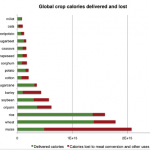biofuels
This just in:
Biofuels produced from switchgrass and post-harvest corn waste could significantly reduce the emissions that contribute to climate change, according to an analysis by EWG and University of California biofuels experts.
EWG’s analysis found that the life cycle carbon intensity of cellulosic ethanol from switchgrass was 47 percent lower than that of gasoline. Ethanol made from corn stover – the leaves and stalks that remain in the field after the grain is harvested – has a life-cycle carbon intensity 96 percent lower than gasoline’s.[1]
By contrast, studies have found that the life…
Emily S Cassidy, Paul C West, James S Gerber and Jonathan A Foley, from the University of Minnesota Institute on the Environment, have produced a very important study for IOP Science Environmental Research Letters. (This is OpenAccess so you can access it openly!) You know Emily as one of the participants in our CONvergence panel on food last July. The research Emily and her colleagues do is some of the most important work being done right now, because it is about the food supply.
The bottom line is this: When we look at our food supply, we find that a large amount of what is grown in…
Richmond Bay Campus Biosciences Address: Jay Keasling - YouTube.
Finally our paper is in press!
in the coming issue of PNAS, we describe a genome-scale model for predicting the functions of genes and gene networks in rice, an important staple food. Called RiceNet, this systems-level model of rice gene interactions allows us to effectively predict gene function. This information can be used to help boost the production and improve the quality of one of the world's most important food staples.
This graphic is a full-size view of a RiceNet layout, color-coded to indicate the likelihood of network links; red for higher and blue for lower likelihood scores…
Daniel Yergin in the Wall Street Journal:
Since the beginning of the 21st century, a fear has come to pervade the prospects for oil, fueling anxieties about the stability of global energy supplies. It has been stoked by rising prices and growing demand, especially as the people of China and other emerging economies have taken to the road.
This specter goes by the name of "peak oil."
Its advocates argue that the world is fast approaching (or has already reached) a point of maximum oil output. They warn that "an unprecedented crisis is just over the horizon." The result, it is said, will be "…
A few readers have asked me to comment on Goldman Sachs' prediction that the US will be the world's largest Oil producer in 2017. I am delighted to do so. Several possible comments come to mind.
1. Apparently Crystal Meth has become the trendy drug at Goldman.
2. How did the Yes Men get this published under Goldman's Name?
3. Goldman is apparently even less optimistic about Saudi oil production than I am. They think the depletion curve is going to be a straight line downwards.
4. Oh, wait, they are talking about "oil" not oil! That "oil" stuff is almost infinite - you can magically turn…
hat tip for this video to Isis and the Thoughtful animal.
Some while ago - probably about 15 years ago - there was a good Steve Bell carton showing the US airforce dropping "ozone friendly" bombs on the ragheads (or the gooks, or the commies, or whoever the enemy was then). It was quite funny, unlike Obama, who isn't.
I shouldn't complain - the Telegraph's energy columnist, Rowena Mason is technically affirming that even non-crazy people can believe in peak oil. Her essay, titled "You Don't Need to be a Mad Max Survivalist to Take Peak Oil Seriously" at least acknowledges the point. Her equation of Mad Max survivalism with "grows root vegetables" is obviously going to annoy me, but I know the kind of people she talks about in the article too, the ones who say we'd better hurry into our bunkers now, so I can forgive that.
But the part that is a little problematic is that she doesn't seem to get the oil…
Hunkered down in an elegant hotel in Washington DC, watching the epic storm continue unabated, I cannot help but think of award winning author Kim Stanley Robinson's "Fifty Degrees Below", the second novel in his three-part trilogy.
In this book, Washingtonians experience the most intense winter on record. As rigid temperatures shut down the city, the main character, Frank, is living in a treehouse in Rock Creek Park and heroic women scientists (I especially like that part) are trying to force the self-absorbed politicians to put in place effective policies to avert a global catastrophe. It…
A couple of years ago, I wrote a post with the above title, about the way that biofuel and meat production in the US was pushing up world food prices. I observed, as has been documented in any number of studies, that when the world's poorest people and the world's richest people's vehicles (or their pets, to their appetite for grain fed meat) compete for food, the cars, pets and rich folk always eat first - the rich come to the table once for their share of staple grains, then three of or four more times for more grains in the form of meat. We then come to the table again for a share for…
tags: politics, pollution, hunger, global warming, environmental destruction, biofuels, overpopulation, birth control, soylent green
Image: Matt Groening (The Simpson's).
A friend sent a link to an interesting article that was published today in the Guardian. This article reveals that the increased reliance on biofuels by the US and the EU is driving a worldwide food crisis. The confidential World Bank report, researched and written by an unnamed but "internationally-respected economist," has not been published but was instead leaked to the Guardian. Among other things, this report claims…


